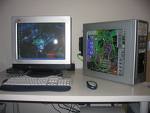While creating a file SWAP in Windows, you can meet the following error message which can prevent you from making as follows:
The arrangement of division used on your hard drive prevents the creation of a file permanent SWAP.
The file SWAP is a space of unit of hard drive which is used as a prolongation of virtual memory for the RAM of the computer (true memory). It improves the execution of system. You can organize a file SWAP as a contiguous space so that less input-output operations are complete file read/write necessary.
You receive this error message if you employ a zone of dialogue of virtual memory while installing Windows or 386 increased options in the control panel to create files SWAP.
Uninitialized fields in the table of partition
Microsoft Windows keeps the complete information of which unit of hard drive it employs when it makes the permanent files SWAP. If you modify inaccurately the unit of hard drive which is made up using the software of third, Windows can find it inadmissible and thus show the loss of errors of disc and data of cause. To avoid such situations of loss of data, Windows makes sure that it identifies the accurate information of unit of hard drive.
In any case, if you modify the unit of hard drive inaccurately, you can encounter serious problems of loss of partition. This situation generally occurs in following cases:
You are use duel-initialize the system and the two operating software’s employ various arrangements of partition.
You computer is reached viruses. Some viruses can create their own partitions of disc and place them like partitions of boot (for example virus of Michael Angelo).
Do not import what the cause of this problem is, the end result would be the loss of your partitions of unit of hard drive and you must carry out the re-establishment of partition. The re-establishment of partition is better using tools of thirds, known under the name of software of re-establishment of partition.

0 comments:
Post a Comment